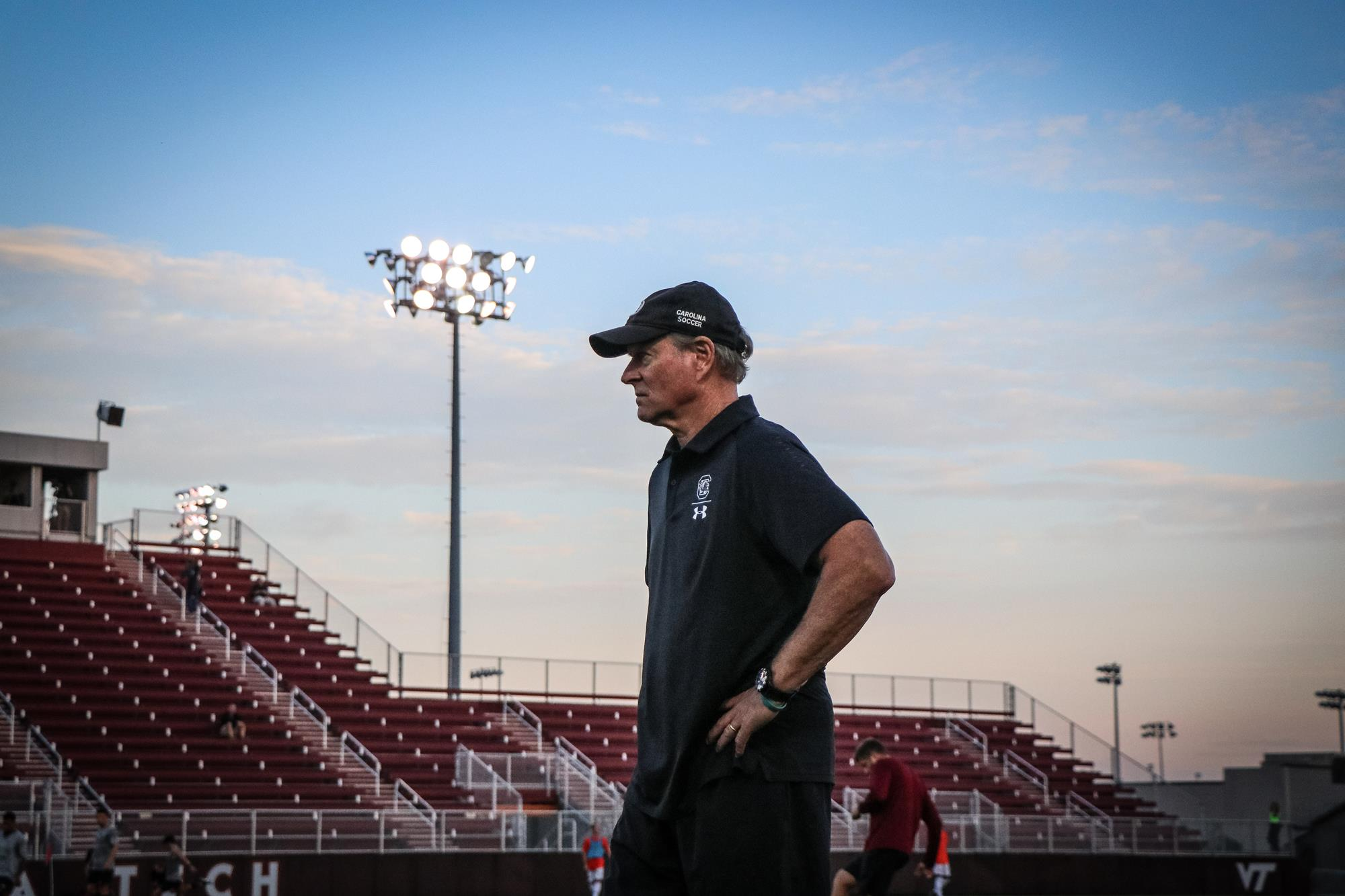Feb. 4, 2003
New York – Hurdler Terrence Trammell and volunteer coach Allen Johnson spoke with the Metropolitan New York Track Writers and media from around the country via teleconference about the upcoming Verizon Millrose Games. Trammell, a former South Carolina Gamecock, is the 2000 Olympic silver medalist in the 110m hurdles, the 2001 World Indoor Championships gold medalist in the 60m hurdles, and the defending USA Indoor 60m champion. On Friday night at the Verizon Millrose Games, Trammell will compete in both the 60m hurdles and the 60m dash. Three-time world champion and 1996 Olympic gold medalist Allen Johnson will compete Friday in the Verizon Millrose Games as well, where he will also run the 60-meter hurdles.
The second stop on USATF’s 2003 Indoor Golden Spike Tour, the Verizon Millrose Games will be broadcast LIVE on Friday, Feb. 7 from 7-9 p.m. Eastern Time on ESPN2 and on Saturday, Feb. 8 from 2:30-4 p.m. on NBC.
Below are excerpts from the teleconferences:
TERRENCE TRAMMELL’S EXCERPTS
Q. What made you decide to try the double at the Verizon Millrose Games?
A. My training’s been going really well, and I feel really strong. So I’m going to give it a try. I’m just trying to get things tuned up. We just have to take it race by race. We just have to go out and execute and do things we work on in practice.
Q. Is there any danger in running back-to-back races?
A. At this level, you’ve got a lot of high-caliber athletes. I don’t think there’s a lot of danger. I think it all comes down to the fitness factor.
Q. Have you been training for 25-minute gap between races at Millrose?
A. With the interval work we do in practice, it shouldn’t be too different. Hopefully it won’t be that challenging. I know there will be a lot of adrenaline, which might cause some fatigue after the first race.
Q. How long has it been since you tried something like this?
A. In Pocatello in 2001. (Trammell won both races at the adidas Golden Spike Invitational, running the 60m in a world-leading 6.45 and the hurdles in 7.66.)
Q. Talk about training with Allen Johnson.
A. I think it’s an extreme asset to train with someone like Allen. Just the knowledge he has of the event is instrumental in how I,ve developed the last few years. Sharing information between the two of us helps us both grow as athletes.
Q. Do you and Allen ever bet on who is going to win a race between the two of you?
A. We’re always talking about going 1-2. We don’t discuss which order. It’s an individual sport but I still feel like we’re like a team. If I were to be behind Allen, that wouldn’t be much of a problem because we’re training with each other every day. There is a type of competitive attitude we have against one another. It’s kind of like going against an older sibling, but understanding only one can win. It’s however the chips fall.
Q. Tell us about your education.
A. I just graduated (from the University of South Carolina) in December. It’s a big weight off of my shoulders. I was telling my agent that this is the first time I’ve been able to go to a track meet without worrying about carrying four or five textbooks with me. Back in the fall, I was carrying 21 credit hours of classes. The last two years, I’ve been a full-time student as well as an athlete. At this level, you can’t afford to have much taking you away from track. I feel like I was at a bit of a disadvantage for a while, but I value my education very much. But now I am able to take care of little things I hadn’t been able to take care of when I was in school.
ALLEN JOHNSON TELECONFERENCE EXCERPTS
Three-time world champion and 1996 Olympic gold medalist Allen Johnson on Tuesday, February 4, spoke with the media via national teleconference. Johnson will compete Friday in the Verizon Millrose Games, where he will run the 60-meter hurdles. Below are excerpts from the teleconference.
Q. You,ve been running Millrose for years. What keeps bringing you back?
A. I think the main thing that brings me back is, it’s a good meet in the United States to run and it has a lot of tradition. The fans are really good. I think it’s the best meet in the United States.
Q. You ran 7.48 to open your season on January 11. Is that the fastest you’ve been that early in the season?
A. Yes, by far. Usually I don’t open up until later in the month. Usually it’s about 7.55 or so. To open at 7.48 is good. It shows I’ve worked really hard in the fall and I’m ready.
Q. Is there a difference in how you approach the 60m hurdles indoors and the 110m hurdles outdoors?
A. No, there’s no difference. The only difference between the 60m indoors and the 110m outdoors is that outdoors is 50m longer. The stride pattern is the same. We have to take the same steps between the hurdles. Because indoors is shorter, it just makes it a little bit more intense.
Q. Terrence Trammell intends to double in the 60 hurdles and 60 sprint at Millrose. It’s your mission to make sure that becomes a moot point before the 60, since the hurdles will be his first race.
A. Everybody who lines up in the 60m hurdles is out there to win the race. I want to win the race on Friday night, but at the same time, I’d like to see him go out there and win both races. I’d especially like him to win the 60. A lot of people say hurdlers can’t sprint, but we can. If he goes out and wins the 60, that will help solidify our reputation.
Q. What do you think about your longevity? Can you go until you’re 40?
A. At this point, everything still feels the same. If I didn’t know how old I was, I wouldn’t know how old I was. I’m going to keep competing at least until 2008. I think after 2008, I’ll kind of play it by year, year to year. I think as long as you take care of your body and eat right and watch out for the injuries, you can stay in it for a long time. You can’t run meets with a pulled hamstring and last in this sport. When there,s a problem, you have to address it. I think that’s why you see more athletes in track and field and other sports competing until they’re 40 years old.
Q. What do you do during your break from competition, September through January?
A. I take off two to three weeks, and I start back training again. There’s not a lot to do in that limited amount of time. I basically come home and just relax. I evaluate the past season and develop a plan for the upcoming year.
My plan for 2003 is to make the World Indoor team, go there and win. After that, I just want to have a healthy and consistent outdoor season. I was ranked #2 last season so I want to improve on that, as well as defend my World Outdoor title. The world record is something that,s always there, but I’m focusing on being consistent. Going into each race, I need to be at my best and perform well.
Q. Does 2000 Olympic gold medalist and 2002 #1-ranked Anier Garcia of Cuba have an advantage over you?
A. I have a lot of respect for Garcia, but he beats me when I’m making mistakes. It’s not even that I need to focus on him, because when I run my race, he never beats me. So I guess his edge is he’s not making as many mistakes.
Q. Any predictions for Millrose?
A. My first race this year was 7.48, so if I don’t run faster than that on Friday, there’s something wrong. I’ll say this: It’s going to take faster than 7.45 to win. Even if I don’t win, it’s still going to take faster than 7.45 to win. I’ve been watching Terrence train, and I really think the race is going to come down to him and me.











